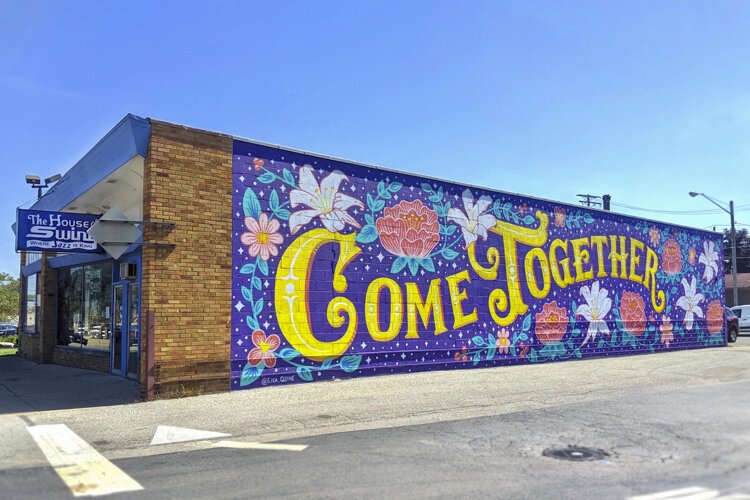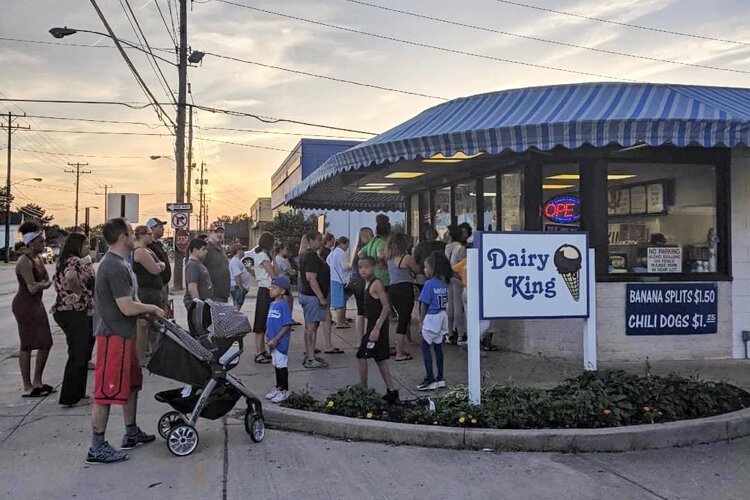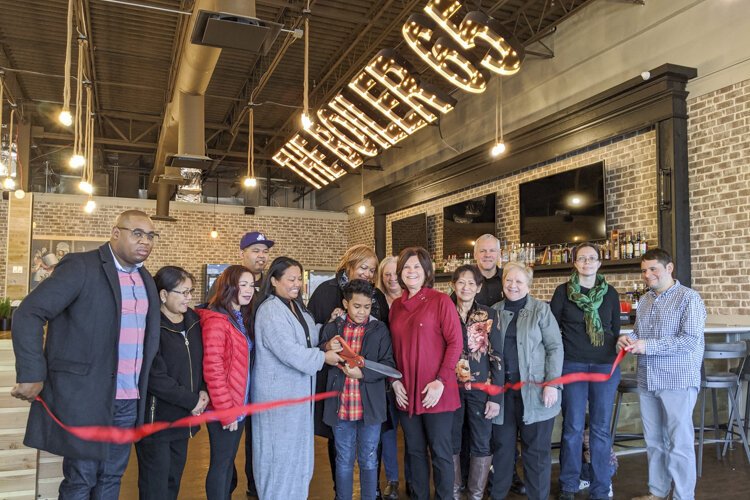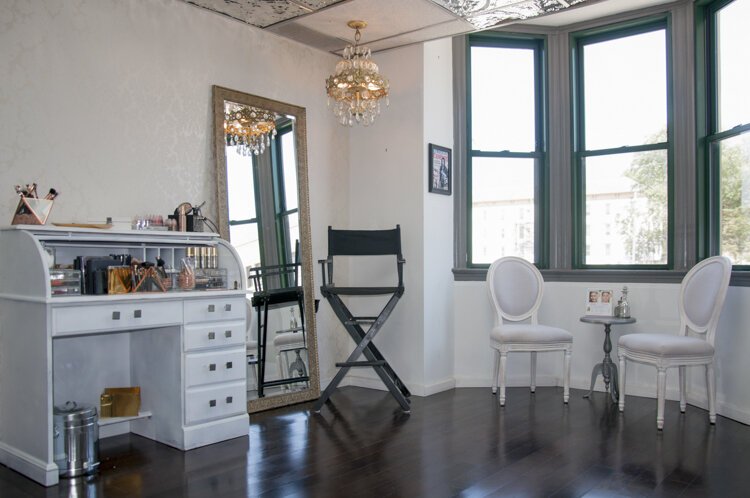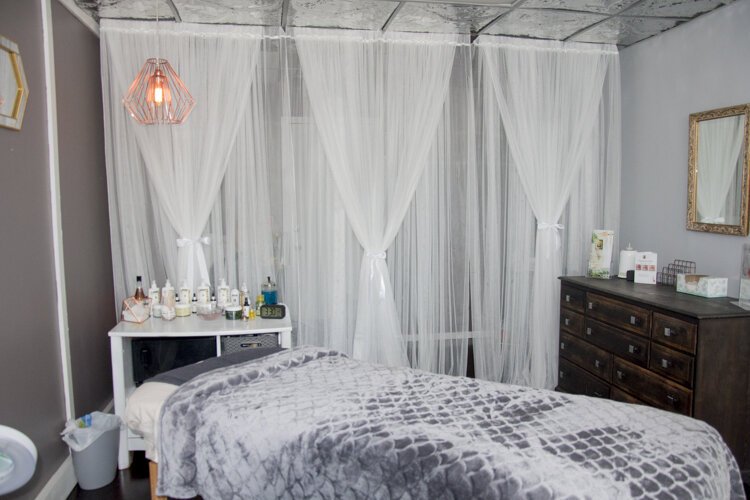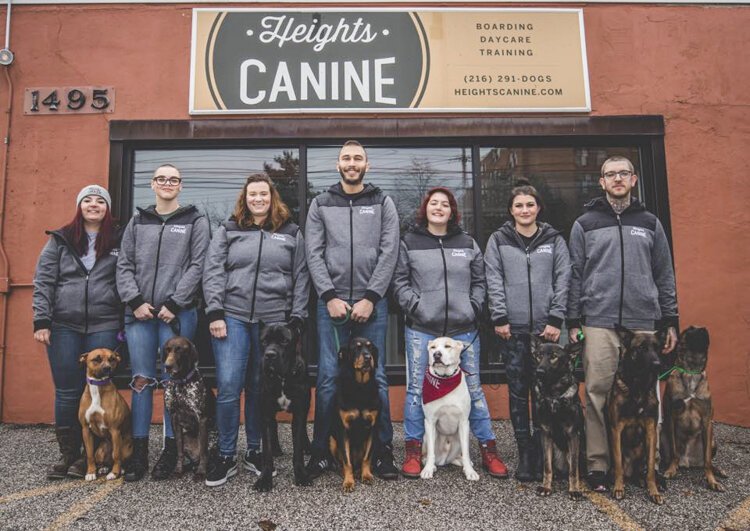Comeback kids: Local retailers prepare to reopen amid coronavirus concerns
As the nation’s economy gradually revives, businesses are facing a brave new world—one shaped by stringent safety guidelines and consumers who are unsure if they’re ready to return.
Lacking the deep pockets of larger corporations, small retailers share a special bond as they unshutter their storefronts, says Abigail Brown, owner of Salon Front and Centerin downtown Berea.
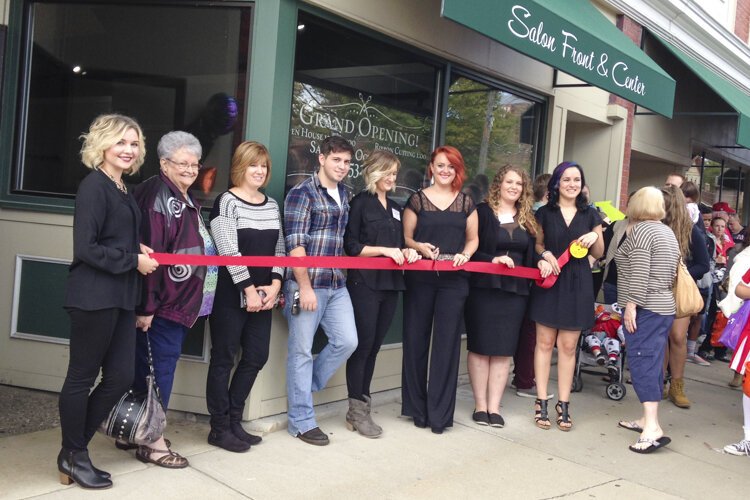 Abigail Brown (6th from left) of Front & Center Salon in Berea.“One unique thing about the pandemic is that clients and business owners are in the same situation,” says Brown. “Our clients have been very supportive. There’s always going to be a sense of impatience to get back regular services, but they’ve [also] been receptive to the changes we’ve made.”
Abigail Brown (6th from left) of Front & Center Salon in Berea.“One unique thing about the pandemic is that clients and business owners are in the same situation,” says Brown. “Our clients have been very supportive. There’s always going to be a sense of impatience to get back regular services, but they’ve [also] been receptive to the changes we’ve made.”
Brown closed on St. Patrick’s Day, though she continued to sell the professional hair and skincare products she regularly carries in her store. Returning to normal operations—however that’s defined in the age of COVID-19—means following protocols set forth by Responsible RestartOhio, with an emphasis on social distancing, mask-wearing and hygiene.
A general set of policies and procedures may not be enough to make customers feel safe, however, so Brown is implementing additional precautions.
Starting Monday, June 1, customers will be required to wait in their vehicles until their stylists are available andbehind-the-ear masks are required for both guests and employees.
Customers’ temperatures will be taken at the door and they will have to answer a short questionnaire about any symptoms they may have. Touch points will be disinfected throughout the day,with all porous supplies—towels, capes, smocks—tossed into the laundry after one use.
Brown also stocked up on hair color products, knowing clients will need extra work done after months away. An extra kick to the pocketbook arrived when the salon owner discovered she needed to replace her hot water tank.
“We’re being hit on every side right now, but that’s part of the business,” Brown says. “I’ve done my best to stay afloat until now. It’s very tough, but I’m grateful we’ll be able to restart.”
Making a comeback
Amid the public health crisis caused by COVID-19, the City of Berea created an emergency relief program to assist business owners like Brown and others with retail, personal services, and food establishments.
Eligible entrepreneurs received $2,000 for rent payments, payroll, utilities, and similar business-related expenses.
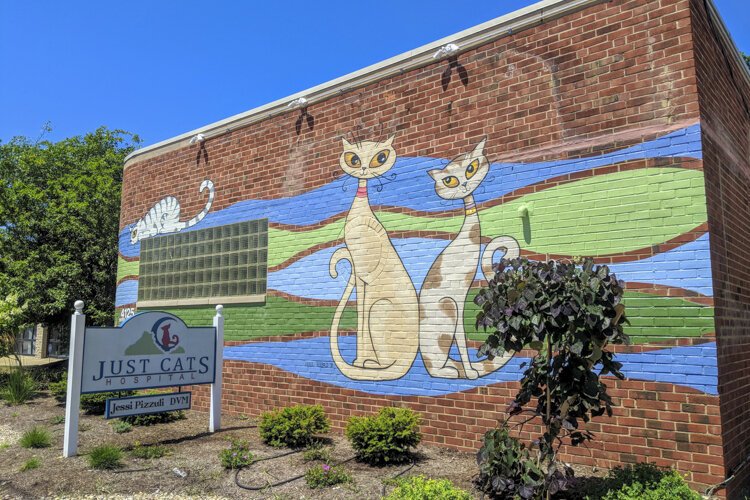 Just Cats Pet Hospital received a storefront renovation grant in 2018 to renovate the exterior and add a mural.Brown used the money for one month’s rent, though the upcoming months are clouded by uncertainty.
Just Cats Pet Hospital received a storefront renovation grant in 2018 to renovate the exterior and add a mural.Brown used the money for one month’s rent, though the upcoming months are clouded by uncertainty.
Her two-floor establishment offers spa, hair, and nail services. But the skin care treatments she used to offer are discontinued for now.
On the happier side, Brown’s been able to bring back every employee, and is fielding questions and concerns from clients.
Salon Front and Center is a volume business and Brown says state-mandated restrictions will prevent her stylists from servicing more than one guest at a time. She also chats with customers who are waiting to see if restarting the economy results in new, local infection spikes.
“I completely respect that—we can’t just open the doors and let everyone fly in,” says Brown. “We’re in a difficult spot, so it’s too hard to say that everything will be fine and normal.”
Ready or Not
Berea economic development director Matthew Madzy says that although the state stay-at-home order is lifted, not every business is prepared to open.
City leaders are conferring with county health officials on guidelines, taking further advice from the Ohio Restaurant Association on how to get eateries safely open.
“The biggest issue for retailers is making up the hole of the last two months,” says Madzy. “Once they’re open, will the customer feel comfortable going out and shopping like they were six months ago? That’s going to depend on the case numbers. The next key period is the next few weeks and then the fall.”
Finding and paying for Personal Protective Equipment (PPE) is particular bugaboo for Berea’s retailers. Plexiglass used to make barriers is scarce, even as the supply chain loosens for masks and disinfectant products.
What’s more, a properly protected business may be a turn-off for customers skittish about a distressing new normal.
“There’s a worry that if you put up plastic, it makes your store look like a quarantine center,” says Madzy. “Berea doesn’t have big box retailers, which is a good thing, but it’s the small businesses that are getting hit hard. We’ve got to do this together.”
Maple Heights has been readying its business district for a comeback since March, providing residents with an online list of available restaurants and other establishments. The economic development office directed retailers to federal Paycheck Protection Program (PPP) resources as well as a $2.5 million county stabilization fund.
Maple Heights economic development director Patrick Grogan-Myers says most owners have strong ties to the community, making the city’s work in keeping them afloat all the more crucial.
“Even through the pandemic, people are looking to grow their business here,” he says. “We are fantastically lucky to have that relationship.”
A feeling of cautious optimism
South Euclid and its One South Euclidcommunity development corporation teamed up in April for a grant program designed to mitigate the financial damage of the coronavirus. The initiative awarded grants of up to $5,000, targeting the type of neighborhood retail deemed non-essential by Ohio Governor Mike DeWine.
South Euclid gave out 47 grants to restaurants, retailers, gyms, and personal care shops. The Cleveland suburb doesn’t have another funding round lined up, but is providing grant leads on the federal, state, and county level, notes South Euclid economic development director Mike Love.
“These are businesses that support local events and youth programming, and are an integral part of the community,” Love says. “They’ve supported us for years and we wanted to return the favor.”
Love is hearing a mix of excitement and trepidation from business owners primed to welcome back patrons. He says about half of the city’s restaurants are holding off on in-person dining— citing a need for PPE and ideal social distancing protocols. Eateries enjoying increased takeout business are prepared to wait until data on new coronavirus cases are released.
“They want it to make sense financially if they’re going to be limited in the amount of tables they can have open,” says Love.
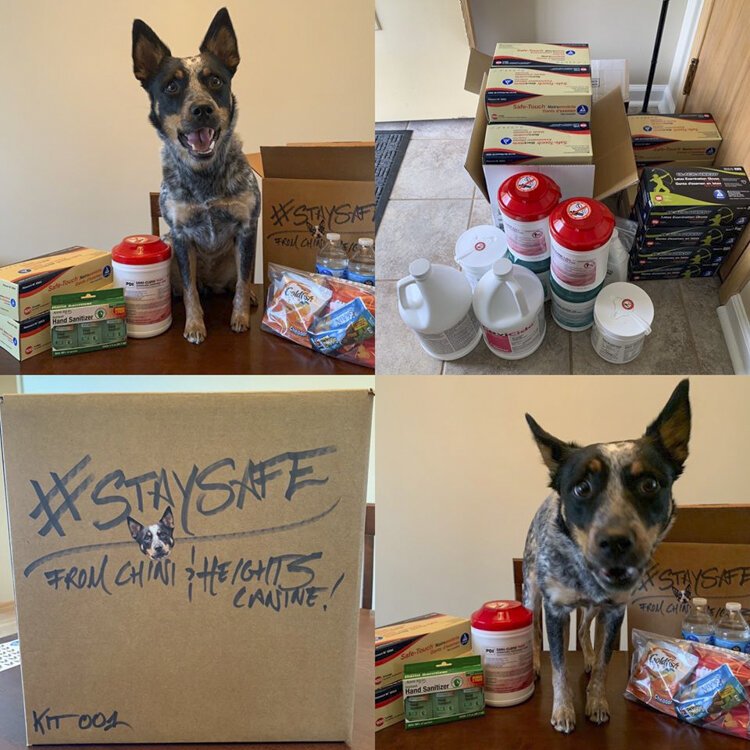 Heights Canine donates disinfectants, nitrile & latex gloves, as well as hand sanitizer and snacks to first responders.Meanwhile, retailers are modifying their storefronts to bring customers the safest possible shopping experience. Heights Canine, a dog training, boarding, and daycare operation on Warrensville Center Road, is implementing a no-contact doggie drop-off/pickup area.
Heights Canine donates disinfectants, nitrile & latex gloves, as well as hand sanitizer and snacks to first responders.Meanwhile, retailers are modifying their storefronts to bring customers the safest possible shopping experience. Heights Canine, a dog training, boarding, and daycare operation on Warrensville Center Road, is implementing a no-contact doggie drop-off/pickup area.
The area is built with a series of gated sections—clients pass their pooches through the gates, removing collars that are replaced with sterile, store-supplied leashes.
“This makes sure the dog is safe and secure, and prevents contact between staff and the client,” says owner Jake Scott. “We don’t want anyone’s personal belongings from home.”
Scott is planning a soft launch on June 1 with limited service hours. Reopening is “a huge, beyond words relief,” he says, considering Heights Canine was at a “100% halt” after DeWine’s stay-at-home order.
Scott’s nine-person staff is returning in full, thanks to a PPP loan created to keep workers on the payroll.
The loan expires June 30, which Scott says he hopes is enough time to ramp up revenue.
He remains cautiously optimistic that his clientele will come back, motivated by new safety measures and the same level of care they’re accustomed to.
“Will people come through those doors? That’s the most important thing,” Scott says. “We create jobs, provide services to residents, and some of our staff live in South Euclid or surrounding suburbs. Creating a fixture of the community is really significant.”
The series is made possible through the support of Citizens Bank, the First Suburbs Consortium, and the First Ring Schools Collaborative.


